Hazard Symbols
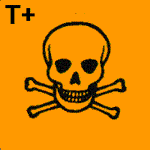
Category: substances and preparations which in very low quantities cause death or acute or chronic damage to health when inhaled, swallowed or absorbed via the skin. Used when there is substantial indication of severe, possibly irreversible damage to health through single, repeated or persistent intake.
Caution: avoid contact with the human body. If you feel unwell, seek
immediate medical advice.
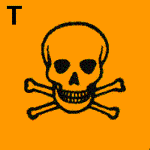
Category: substances and preparations which in low quantities cause
death or acute or chronic damage to health when inhaled, swallowed or
absorbed via the skin. Used when there is substantial indication of severe,
possibly irreversible damage to health through single, repeated or persistent
intake, especially in the case of substances suspected of being carcinogenic,
causing genetic damage or being toxic to reproduction.
Caution: avoid all contact with the human body. If you feel unwell, seek
immediate medical advice. Used in the case of substances categorized
as carcinogenic, causing genetic damage or being toxic to reproduction.
Special precautions have to be taken when these harmful substances are
handled!
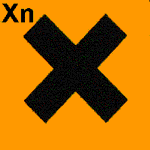
Category: inhalation, ingestion, or skin contact may cause acute or
chronic damage to health. Used when there are indications of severe,
possibly irreversible damage to health through single, repeated or persistent
intake, especially in the case of substances suspected of being carcinogenic,
causing genetic mutation or being toxit to reproduction. May cause sensitization
by inhalation (when categorized under risk phrase R 42). Caution: avoid
contact with the human body. Used in the case of substances suspected
of being carcinogenic, causing genetic damage, or being toxic to reproduction.

Category: acute, persistent or repeated contact with the skin or mucous
membranes may cause inflammation without being corrosive. May cause sensitization
by skin contact (when classified under risk phrase R 43). Caution: avoid
contact with eyes and skin. Do not inhale vapors.
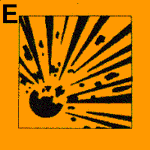
Category: substances and preparations which may react exothermically without atmospheric oxygen and which under defined test conditions detonate, quickly deflagrate or upon heating explode when partially confined.
Caution: avoid impact, vibration, friction, sparks, fire and exposure
to heat.

Category: organic peroxides that are flammable even if they do not come in contact with flammable materials. Other substances and preparations that generally themselves are not flammable, but which, on contact with flammable materials, substantially increase the risk and violence of a fire, primarily by releasing oxygen.
Caution: avoid all contact with flammable substances.
Risk of ignition: fires that have started may be promoted and fire-fighting
measures hampered.
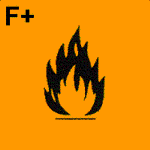
Category: liquids with a flashpoint less than 0 °C and a boiling point of 35 °C max. Gases and gas mixtures that are flammable in air under normal pressure and ambient temperature.
Caution: keep away from naked flames, sparks and sources of heat.
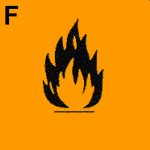
Category: liquids having a flash point below 21 °C but which are not extremely flammable. Solid substances and preparations which may readily catch fire after brief contact with a source of ignition and which continue to burn or to be consumed after removal of the source of ignition.
Caution: keep away from naked flames, sparks and sources of heat.
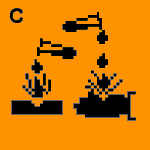
Category: destruction of skin tissue, through the entire layer of healthy intact skin or when this outcome can be predicted.
Caution: take special measures to avoid contact with eyes, skin and
clothing. Do not inhale vapors! If you have an accident or feel unwell,
seek immediate medical advice.
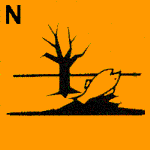
Category: on release into the aquatic and nonaquatic environment may cause damage to the ecosystem by changing the natural balance either at once or after a delay. Some substances or their transformation products can impair several environmental compartments simultaneously.
Caution: to an extent depending on the potential danger, do not dispose
of in the drains, soil or the environment. Follow special disposal regulations.